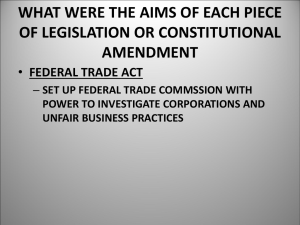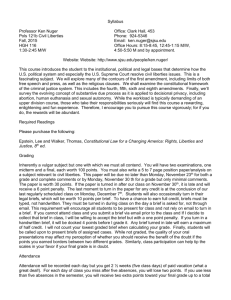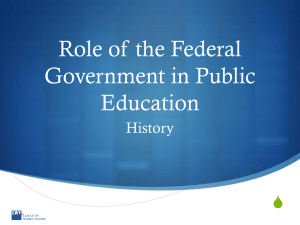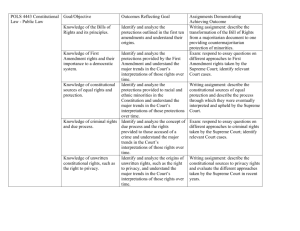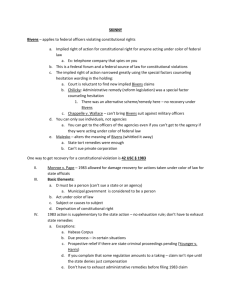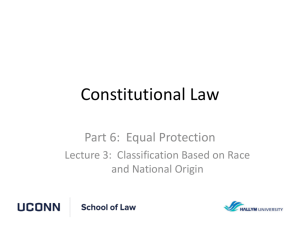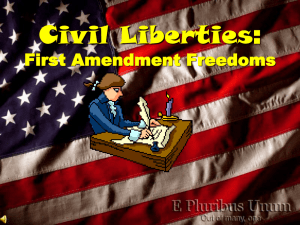FREEDOM-OF-EXPRESSION-SPEECH-AND
advertisement
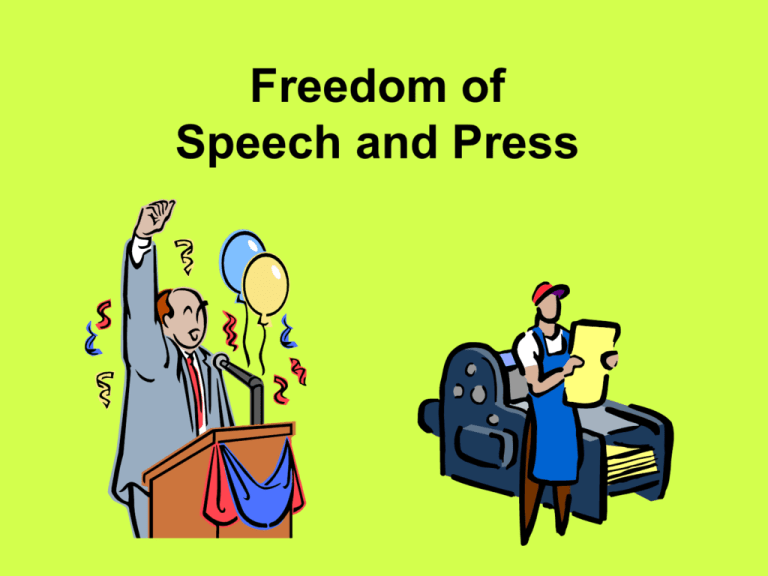
Freedom of Speech and Press Freedom of Expression • The 1st amendment has two guarantees on freedom of expression #1 Guarantee to each person a right of free expression [spoken or written] by all means of communication #2 Guarantee all persons a wide-ranging discussion of public affairs What is the real intention of this freedom? • Protect the expression of unpopular views • BUT it doesn’t protect all forms of expression because no person has unbridled right to free speech Origins of the Expression Clauses • There are three important factors which led to increased sentiment for freedom of speech in America • English origins #1 – Kings during the 17th and 18th century England tried to suppress criticism of the government • Passed Licensing act of 1662 which authorized royal officials to investigate and seize printed works, especially if it wasn’t licensed before #2 • Attacks on Free Expression in the Colonies – Early colonists used methods to suppress criticism and dissent • Fines • Imprisonment #3 • The Constitutions of the States – Virginia adopted a state constitution which began with a Declaration of Rights that included freedom of the press – Constitution of Pennsylvania contained provisions for freedom of the press, speech, and petition What is Speech? • Any form of communication • Verbal and NonVerbal Pure Speech • Peaceful expression of thoughts • Ie: campaign speech, chat with a friend Speech Plus • Verbal expression + Action • Marching or Demonstrating • Not obstruction of traffic, blocking sidewalks, endangerment Symbolic Speech • Nonverbal expressions • Wearing arm bands, picketing, burning draft cards, burning the flag Spence v. Washington • College student attached a peace symbol to a U.S. flag and hung it upside down the window of his private apartment to protest military action in Cambodia during the Vietnam War and killing of 4 students at Kent State • Convicted of violating a state statute which made it a crime to place a mark or picture on the U.S flag • DECISION: Supreme Court saw conviction as a violation of his 1st amendment because this was a case “of prosecution for the expression of an idea through activity” – 1st amendment protects actions that express an idea just as it protects what people say and write Balance • Free Speech is limited enough to keep order and maintain your natural rights. Limited Speech: 3 types NOT supported by 1st Amendment A. National Security During WWII and Cold War, laws were passed to check and control persons whose, by written or spoken word, advocated violence against the government and its actions Limited Speech B. Fighting Words These are words which can be expected to provoke a hostile reaction in a reasonable person C. Lewd, obscene, profane, libelous, and fighting are not protected Fighting Words • Provoke someone to fight. Slander • A statement in public that holds a person up for contempt, ridicule, or hatred. Libel • Published Report of falsehoods intended to injure someone’s reputation. • Example Tiger Woods’ ex-wife, suing a Irish newspaper for saying she posed nude. Clear and Present Danger Test Schenk v. United States 1919 Schenk distributed pamphlets urging men to resist the draft during WWI. Arrested Constitutional Government may only silence speech when there is a clear and present danger Wartime speech can be limited if it threatens national security. Bad Tendency Test Gitlow v NY 1925 Published pamphlets urging a violent revolution and overthrow of the government for socialism. Constitutional: Red Scare begins. Any speech intended to incite crime or disturb the peace. (only lasts about 10 years) Dennis v. United States 1951 Clear and Probable Danger • 11 leaders of the Communist Party were arrested under treason in 1951 for using Communist writings that Compelled a gov overthrow. • Constitutional Yates v. United States 1957 • 89 people were convicted for the same reason six years later. • Found Unconstitutional • Made a distinction between advocating the overthrow of the government and actually doing so Brandenburg v. Ohio 1969 Now accepted Brandenberg Test • Found that even advocating a violent overthrow is protected • Need to show that there is actually immediate actions, and likely to produce a result. FREEDOM OF THE PRESS 4chan.org/b/ Ancient Aliens did this Prior restraint • Censorship • Government has no right to restrain speech before it is expressed. New York Times v. United States • New York Times was about to publish the Pentagon papers, which told the secret history of the U.S. GOV involvement in the Vietnam War. GOV wanted a court order to stop printing, claiming it threatened national security • Found constitutional, rejected plea to ban publication.

